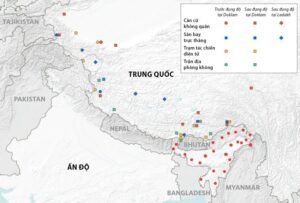
The Chinese military was ordered to restrain the US 2
`Soldiers were ordered not to shoot first. Pilots and naval officers were asked to exercise maximum restraint in increasingly frequent encounters with US warships and aircraft,` said anonymous sources familiar with the situation.
A source close to the Chinese Ministry of Defense said Beijing sent a notice to Washington that `the Chinese military was ordered not to fire first` to show goodwill.
Two US aircraft carrier groups practiced in the East Sea in July. Photo: US Navy.
The information was released in the context that Beijing is trying to cool tensions with Washington in the East Sea.
US Defense Secretary Mark Esper had a phone call last week with his Chinese counterpart Wei Fenghe, expressing concern with China’s destabilizing activities in the East Sea and the area near Taiwan.
Meanwhile, the Chinese Defense Minister urged the US to `stop using wrong words and actions, improve the ability to control maritime risks, and avoid taking dangerous steps that could escalate tensions.`
According to sources, the call was proposed by the Pentagon last month, but the Chinese side initially showed no interest.
July is the time when the US simultaneously deployed two aircraft carrier battle groups for exercises in the East Sea, as well as conducted many night reconnaissance flights near the coasts of Guangdong and Fujian provinces.
Some sources said the Chinese military is concerned about the risk of unintended clashes breaking out, although it still describes the US aircraft carrier battle groups rehearsing in the East Sea as `paper tigers`.
US Secretary of State Mike Pompeo issued a statement last month rejecting China’s claims to resources in most of the South China Sea, calling the country’s moves to control them `completely unjustified`.
Washington said it is adjusting its stance on China’s claims in the East Sea in accordance with the contents of the 2016 ruling from the Permanent Court of Arbitration.
China initially reacted fiercely to the US moves, but in recent weeks, Beijing’s senior diplomats have gradually changed their tone, calling for dialogue between the two sides to control risks.
In the interview, Mr. Wang did not mention the `nine-dash line` China unilaterally drew to claim sovereignty over most of the East Sea, but declared that this sea is `a common home for countries in the East Sea.`






